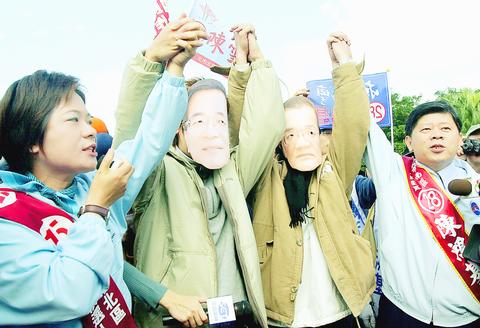As Taiwan counts down to election day, a group of protesters yesterday called for a post-poll coalition between the ruling DPP and the opposition KMT to break the legislative gridlock and save the economy.
Impersonators of President Chen Shui-bian (陳水扁) and KMT Chairman Lien Chan (連戰), walked down a red carpet outside the Presidential Office for a conciliation handshake, escorted by the two KMT candidates who organized the protest.

PHOTO: CHIANG YING-YING, TAIPEI TIMES
The candidates urged the DPP and the KMT to set aside their enmity and cooperate to save the nation's economy, which has plunged into recession with unemployment climbing to record levels.
"KMT-DPP cooperation to save Taiwan," the candidates, Chen Horng-chi (
Chen, who ended 55 years of KMT rule after winning last year's presidential poll, has sent up trial balloons lately, offering to share power with opposition parties in a broadbased post-election coalition government.
Opposition leaders have cold-shouldered Chen's reconciliation overtures, insisting the party with the most number of seats in parliament should form the new Cabinet.
Yesterday's protest was seen by analysts as a sign of an emerging rift in the ranks of the KMT, who suspect the DPP plans to poach its legislators after the elections.
Beating gongs and drums, a convoy of 400 cars stretching several kilometers drove to the Presidential Office and blew their horns in a show of support for political reconciliation between the KMT and the DPP.
"We hope the two parties set aside their enmity to save Taiwan's economy," protest leader Chen Hsueh-fen said.
Riot police armed with clubs and shields stood by and barbed-wire barricades were set up on streets leading to the Presidential Office.
No violence was reported.
On Saturday, about 1,500 flag-waving protesters marched through the capital, calling for the KMT to merge with their splinter parties to help its chances of recapturing the presidency in 2004.

Right-wing political scientist Laura Fernandez on Sunday won Costa Rica’s presidential election by a landslide, after promising to crack down on rising violence linked to the cocaine trade. Fernandez’s nearest rival, economist Alvaro Ramos, conceded defeat as results showed the ruling party far exceeding the threshold of 40 percent needed to avoid a runoff. With 94 percent of polling stations counted, the political heir of outgoing Costa Rican President Rodrigo Chaves had captured 48.3 percent of the vote compared with Ramos’ 33.4 percent, the Supreme Electoral Tribunal said. As soon as the first results were announced, members of Fernandez’s Sovereign People’s Party

MORE RESPONSIBILITY: Draftees would be expected to fight alongside professional soldiers, likely requiring the transformation of some training brigades into combat units The armed forces are to start incorporating new conscripts into combined arms brigades this year to enhance combat readiness, the Executive Yuan’s latest policy report said. The new policy would affect Taiwanese men entering the military for their compulsory service, which was extended to one year under reforms by then-president Tsai Ing-wen (蔡英文) in 2022. The conscripts would be trained to operate machine guns, uncrewed aerial vehicles, anti-tank guided missile launchers and Stinger air defense systems, the report said, adding that the basic training would be lengthened to eight weeks. After basic training, conscripts would be sorted into infantry battalions that would take

GROWING AMBITIONS: The scale and tempo of the operations show that the Strait has become the core theater for China to expand its security interests, the report said Chinese military aircraft incursions around Taiwan have surged nearly 15-fold over the past five years, according to a report released yesterday by the Democratic Progressive Party’s (DPP) Department of China Affairs. Sorties in the Taiwan Strait were previously irregular, totaling 380 in 2020, but have since evolved into routine operations, the report showed. “This demonstrates that the Taiwan Strait has become both the starting point and testing ground for Beijing’s expansionist ambitions,” it said. Driven by military expansionism, China is systematically pursuing actions aimed at altering the regional “status quo,” the department said, adding that Taiwan represents the most critical link in China’s

EMERGING FIELDS: The Chinese president said that the two countries would explore cooperation in green technology, the digital economy and artificial intelligence Chinese President Xi Jinping (習近平) yesterday called for an “equal and orderly multipolar world” in the face of “unilateral bullying,” in an apparent jab at the US. Xi was speaking during talks in Beijing with Uruguayan President Yamandu Orsi, the first South American leader to visit China since US special forces captured then-Venezuelan president Nicolas Maduro last month — an operation that Beijing condemned as a violation of sovereignty. Orsi follows a slew of leaders to have visited China seeking to boost ties with the world’s second-largest economy to hedge against US President Donald Trump’s increasingly unpredictable administration. “The international situation is fraught